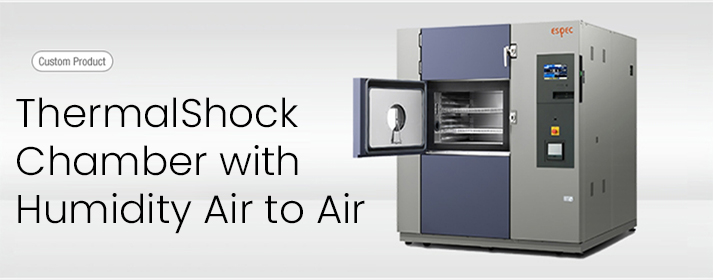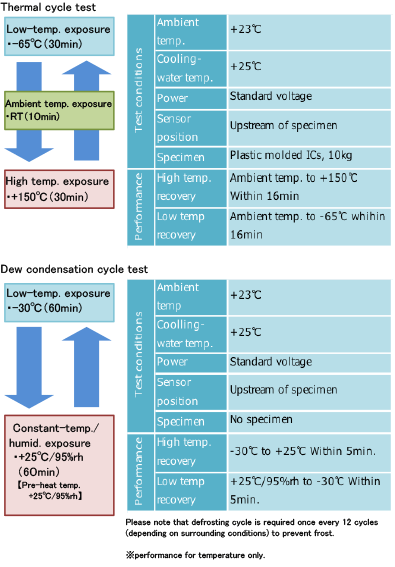THERMALSHOCK CHAMBER WITH HUMIDITY AIR TO AIR

Thermal cycle testing and dew cycle testing in a single unit
Nowadays, vehicles use more and more integrated electronics and the upgrade and improvement of the multifunctional control features of microcomputers plays a great role in these. Electronic control units (ECUs), need to be reliable as it enables the control processes, providing better fuel efficiency and a safe and comfortable ride. According to this trend, safety standards such as ISO26262 and IEC61508 require high environmental stress that is generated by thermal shock chambers for higher reliability of vehicle equipments.
Mobile devices, such as laptops, smartphones, and cell phones, and electronic parts that demand has being accelerated in automotive industry (harness, ECU, PCU, etc.) are subjected to rapid temperature changes as they are moved between outside and inside environments. Naturally, these products and parts require thermal cycle testing, which repeatedly subjects them to rapid warming and cooling. Dew condensation that forms as a result of temperature changes also poses a major problem. Dew condensation can greatly affect the performance and function of electronic devices and result in corrosion, migration, or malfunction. Therefore, dew cycle testing, which repeatedly re-creates dew condensation and dry conditions is essential. "Air to Air Thermal Shock Chamber with Humidity" is an innovative hybrid test system that enables both tests in a single unit. Two tests that have conventionally required two separate test chambers can now be performed in one unit, thereby lowering costs and space requirements.
Innovative hybrid test system
The hot chamber at the top of the thermal shock chamber (TSA) has been changed to a high temperature and humidity chamber that can control humidity, thereby enabling dew cycle tests. With this new feature, it is possible to start a dew condensation cycle test right offer the completion of thermal cyde test, which is not possible with conventional thermal shock chamber.
Conventional thermal cycle testing also available
Simply operate a switch to selecting either thermal cycle or dew condensation cycle testing.
Features similar to a simple humidity cycle chamber
- Excellent dew condensation.
- Prevention of water droplets falling from the ceiling by the control of the temperature on test area walls surface.
- Control of the dew condensation time and distribution by air circulation control device.
You can set dry process through the controller for dew cycle test
The dry process can now be set through the controller, which makes it easy for you to carry out bias and non-bias tests both in dew condensation and dry operation, which is essential for automotive parts.

